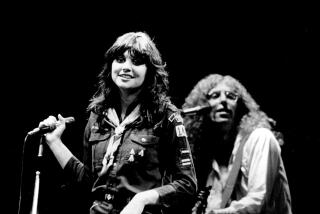JAZZ TEAM’S TALE OF A THOUSAND & ONE SONGS
- Share via
Jackie Cain and Roy Kral are the longest-lasting team in jazz.
As a unit, they began their collaboration in Chicago, early in 1948, playing clubs like Jump Town and singing at concerts given by Dave Garroway. As a union, they exchanged vows June 27, 1949, after completing 14 months on the road with Charlie Ventura’s small band. Except for eight months back with Ventura in 1953, they have been on their own ever since, bringing their special light, right touch to a thousand songs.
Interviewed by telephone in San Francisco just before their opening Thursday at the Vine St. Bar & Grill, they dealt with the sempiternal question: How do they keep looking and sounding so young?
“I guess our fans are getting older and their eyesight isn’t so good; that would explain how they think we look,” Cain said.
“Nonsense,” said Kral. “Jackie looks fabulous, as always. As for our music, we’re doing essentially the same thing we always did, and that’s what people want.”
Cain added: “We enjoy our life; we love to travel, and when you’re doing something for a living that really pleases you, this helps your disposition, your health, everything.”
The Krals’ track record has seen them through 30 albums, some of which are now cropping up as reissues. “I just heard,” Kral, said, “that two of the very first albums we made, for the Storyville label around 1955, are coming out again. That’s good, because copies of those records have been changing hands at $75.”
As always, the Krals’ performances mirror their innate artistry: his as singer, pianist and arranger, occasionally as composer; hers as the perfect vocal teammate but also as a delicate ballad singer.
Over the years they have occasionally devoted entire albums to one composer. Among their best was a set of songs by Dory and Andre Previn, for Columbia in 1963. Lately, they have come up with such ingenious theme albums as “Bogie (Fantasy F 9643),” which contains songs either from Bogart films or relating in some way to his personality. Among the tunes are “Peter Lorre” “The Fat Man” and Kral’s “Play It Again, Sam.”
“Last year,” Kral said, “we began putting together an Alan Jay Lerner collection. This was before he died, but sadly, he never got to hear us do it. Most of the music is by Frederick Loewe, and some by Burton Lane. We’ll be doing this for our first show at Vine St., and our Bogie songs for the second set.”
The road has been smooth for them through the decades, but there have been traumas. “The only time we really aged some,” said Cain, “was when we lost our older daughter.” (Nicoli Kral was 20 when she died in a car accident in 1973.) In another loss, Kral’s sister, the respected singer Irene Kral, died in 1978.
Their younger daughter, Dana, has been heard recently singing on three network television commercials. “She’s a great singer, but doesn’t care much about making a career of it,” Cain said.
“Roy’s daughter by his previous marriage, Tiffany, has presented him with a little granddaughter. And Irene’s daughter, our niece Jody Burnett, came to visit us last weekend; she’s a cellist in Los Angeles who’s been getting lots of studio calls from people like (composer) Lalo Schifrin. So she’s carrying on the family tradition.”
The Krals express musical values that are in short supply today. Their relatively quiet blend and sensitively fused empathy finds a loyal retinue of fans among those who prefer subtlety to stridency.
They have remained true to themselves, never giving in to the temptation to “modernize” their act. “Once, quite some years ago,” Cain recalled, “we did an album of Beatles songs, and some people were disappointed, on the grounds that we had gone commercial. But that wasn’t our intention; we simply thought the Beatles had some first-rate material and we used it. But since the consensus seemed to go against us, we haven’t done anything like that since then.”
Claiming that time pressures prevent them from visiting the stores to catch up on new records, they have few comments on other singing groups. “Manhattan Transfer, of course, is terrific,” Kral said, “and Bobby McFerrin is almost a vocal group by himself. I’ve also heard a record by those excellent L.A. Voices, with Supersax.”
Listening to those who have followed them will not affect whatever lies ahead for the Krals. Their style and direction, established almost 40 years ago, seems as firmly set today as when the critics first saluted them. Kral sums up their philosophy by repeating a timeworn but appropriate cliche: “We’re going to keep on doing it till we get it right.”
More to Read
The biggest entertainment stories
Get our big stories about Hollywood, film, television, music, arts, culture and more right in your inbox as soon as they publish.
You may occasionally receive promotional content from the Los Angeles Times.










